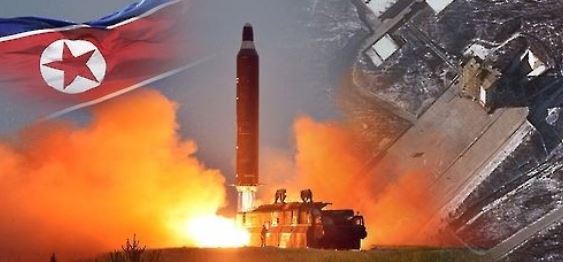Pentagon: NK's nuclear program can only be destroyed by ground invasion
By YonhapPublished : Nov. 6, 2017 - 09:23
WASHINGTON -- The Pentagon assesses that the only way to destroy North Korea's nuclear weapons program with certainty is through a ground invasion, according to a letter to US lawmakers.
Michael Dumont, vice director of the Joint Chiefs of Staff, was responding to a request from Reps. Ted Lieu (D-CA) and Ruben Gallego (D-AZ) to provide assessments of the expected casualties and possible military operations in the event of a conflict with North Korea.
Many political leaders have been concerned by the prospect of war in the wake of North Korea's missile and nuclear tests and the bellicose exchange of threats between US President Donald Trump and North Korean leader Kim Jong-un.

"The only way to 'locate and destroy -- with complete certainty -- all components of North Korea's nuclear weapons programs' is through a ground invasion," Dumont wrote in the Oct. 27 letter posted on Lieu's official Web site.
"A classified briefing is the best venue for a detailed discussion of our capabilities to counter North Korea's ability to respond with a nuclear weapon and to eliminate North Korea's nuclear weapons located in deeply buried, underground facilities."
North Korea could also retaliate with biological and chemical weapons, the details of which would be best discussed in a classified setting, the letter added.
On casualty estimates, Dumont said the numbers will depend largely on the nature, intensity and duration of a North Korean attack. He noted that Seoul is home to some 25 million people and just 35 miles from the demilitarized zone, the de facto border between North and South Korea.
"Calculating even the roughest 'best- or worst-case casualty estimates' for any conventional or nuclear attack is challenging,"
he said. "We continually evaluate what actions North Korea might take, and its capability and capacity to attack (South Korea), Japan, or Guam, and in particular Seoul, with long-range artillery, rockets, and ballistic missiles."
In terms of providing humanitarian assistance during or after conflict, Dumont said South Korea will have the primary responsibility for "post-conflict and transitional operations" on the Korean Peninsula. Any response by the US government would be handled by the Department of State and the US Agency for International Development.
The Pentagon also has a set of up-to-date contingency plans to address possible opposition from China or Russia to the use of US military force, according to Dumont.
"There are several key areas where our interests do not diverge significantly, and it is possible both Russia and China may prefer to avoid conflict with the United States, or possibly cooperate with us, at least in those areas where our interests overlap," he said. (Yonhap)



![[Exclusive] Korean military set to ban iPhones over 'security' concerns](http://res.heraldm.com/phpwas/restmb_idxmake.php?idx=644&simg=/content/image/2024/04/23/20240423050599_0.jpg&u=20240423183955)

![[Graphic News] 77% of young Koreans still financially dependent](http://res.heraldm.com/phpwas/restmb_idxmake.php?idx=644&simg=/content/image/2024/04/22/20240422050762_0.gif&u=)



![[Pressure points] Leggings in public: Fashion statement or social faux pas?](http://res.heraldm.com/phpwas/restmb_idxmake.php?idx=644&simg=/content/image/2024/04/23/20240423050669_0.jpg&u=)










